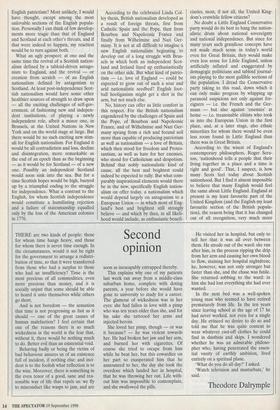Second opinion
THERE are two kinds of people: those for whom time hangs heavy, and those for whom there is never time enough. In the circumstances, would it not be right for the government to arrange a redistri- bution of time, so that it were transferred from those who had a surplus to those who had an insufficiency? Time is the most precious of all commodities, even more precious than money, and it is socially unjust that some should be able to hoard it unto themselves while others go short.
And is not boredom — the sensation that time is not progressing as fast as it should — one of the great causes of human malefaction? I feel certain that one of the reasons there is so much wickedness in the world is the fear that, without it, there would be nothing much to do. Better evil than an existential void.
Behaving badly or being the victim of bad behaviour assures us of an existence full of incident, if nothing else: and inci- dent is to the foolish what reflection is to the wise. Moreover, there is something in the even tenor of a good, sane and rea- sonable way of life that repels us: we fly to misconduct like wasps to jam, and are soon as inescapably entrapped thereby.
This explains why one of my patients last week ran away from a middle-class suburban home, complete with doting parents, a year before she would have gone to university to study for a career. The glamour of wickedness was in her eyes: she had fallen in love with a pimp who was ten years older than she, and for his sake she tattooed her arms and injected heroin.
She loved her pimp, though — or was it because? — he was violent towards her. He had broken her jaw and her arm, and burned her with cigarettes. Of course she tried to escape from him while he beat her, but this cowardice on her part so exasperated him that he announced to her, the day she took the overdose which landed her in hospital, that he was throwing her out. Life with- out him was impossible to contemplate, and she swallowed the pills. He visited her in hospital, but only to tell her that it was all over between them. He strode out of the ward: she ran after him, in the process ripping the drip from her arm and causing her own blood to flow, staining her hospital nightdress; he, however, was not only stronger but faster than she, and the chase was futile. She returned sobbing to the ward: in him she had lost everything she had ever wanted.
In the next bed was a well-spoken young man who seemed to have retired prematurely from life. In the ten years since leaving school at the age of 17 he had never worked, not even for a single day. He evinced no desire to do so and told me that he was quite content to wear whatever cast-off clothes he could find in dustbins and skips. I wondered whether he was an admirable philoso- pher who, having penetrated the essen- tial vanity of earthly ambition, lived entirely on a spiritual plane.
`What do you do all day?' I asked.
`Watch television and masturbate,' he said.
Theodore Dalrymple










































































 Previous page
Previous page